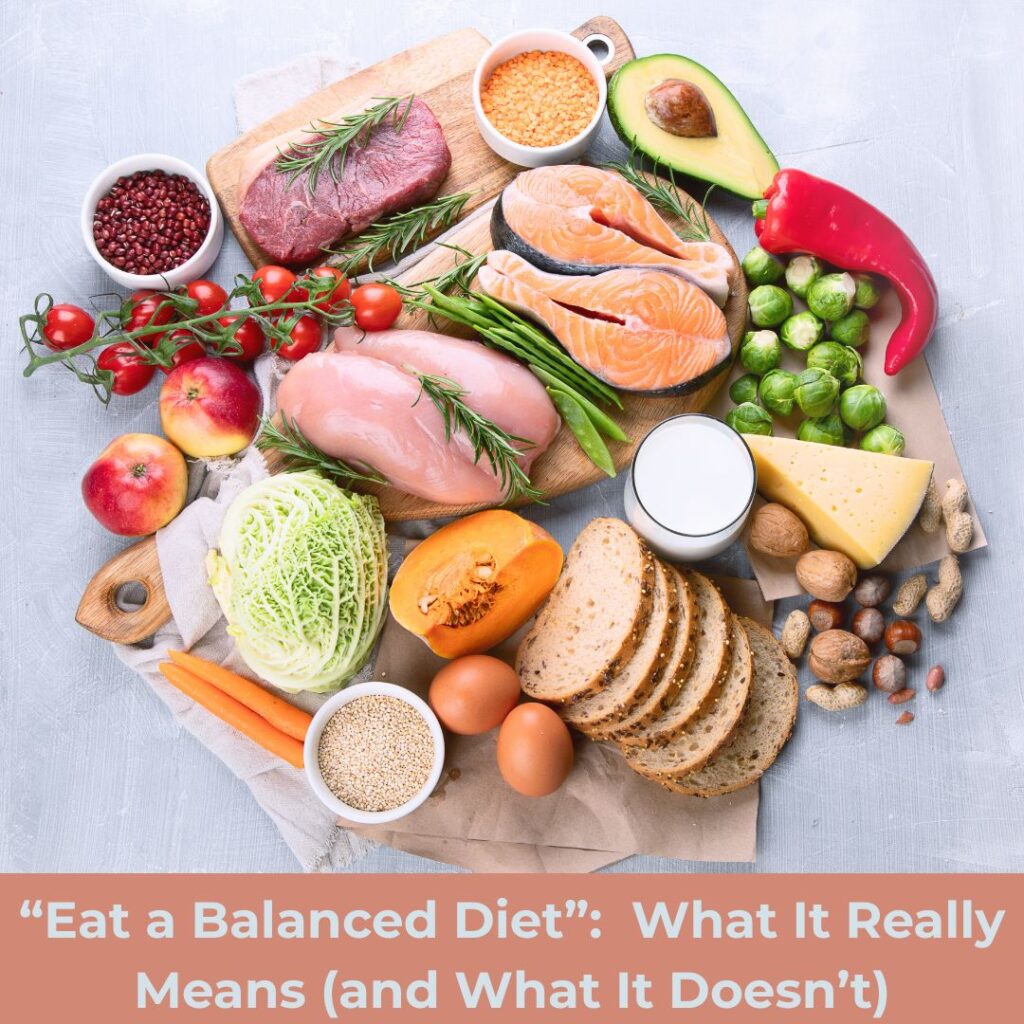“Eat a Balanced Diet”: What It Really Means (and What It Doesn’t)
June 24, 2025

We’ve all heard it before:
“You just need to eat a balanced diet.”
It sounds simple—until you’re trying to figure out what that actually means in real life, especially if you’ve spent years navigating food rules, restriction, or chronic dieting.
As a dietitian who specializes in a non-diet approach, I’ve seen how the phrase “eat a balanced diet” often gets tangled up in guilt, perfectionism, and pressure. But what if balance wasn’t about doing it perfectly—but about caring for your body in a way that feels flexible, realistic, and kind?
Let’s unpack what it truly means to eat a balanced diet—and what it definitely doesn’t mean.
What It Does Mean to Eat a Balanced Diet
1. Variety Over Perfection
Eating a balanced diet isn’t about assembling the perfect plate at every meal. It’s about variety over time—getting a mix of foods across the days and weeks. That includes fruits, vegetables, proteins, carbs, fats, and yes, even fun foods.
🍕 One day might include roasted veggies, brown rice, and salmon. Another might be pizza and a side salad. Both can be part of a balanced way of eating.
2. Listening to Your Body
Instead of following external rules, balanced eating means tuning into your hunger, fullness, and satisfaction cues. Some days your body may ask for more carbs. Other days, a crisp salad or a warm bowl of soup might sound best. It’s all part of the ebb and flow of intuitive eating.
3. Including Nutrition—Without Rigidity
To eat a balanced diet, nutrition does matter—but not in a rule-bound or obsessive way. Gentle nutrition means making choices that support how you want to feel—energized, focused, satisfied—not because you “should,” but because you care.
🥣 For example, you might add some protein or fiber to a snack because you know it helps you stay full—not because you’re trying to hit a macro goal.
4. Making Room for Satisfaction
True balance includes foods that bring you joy. A meal that looks good on paper but leaves you unsatisfied is not balanced. Eating is not just about nutrients—it’s about enjoyment, culture, connection, and comfort.
What It Doesn’t Mean to Eat a Balanced Diet
1. It’s Not About Earning or Burning Food
Eating a balanced diet doesn’t mean you have to compensate for meals with exercise or “make up” for a treat the next day. Your body needs consistent nourishment—without conditions attached.
2. It Doesn’t Mean Eating Clean or Perfect
Balance isn’t the same as “eating clean” or cutting out entire food groups. It’s not about choosing the lowest calorie, lowest carb, or most “nutrient-dense” option at every turn. It’s about meeting your needs in a way that’s sustainable, not stressful.
3. It Doesn’t Mean You’ll Eat the Same Every Day
Eating a balanced diet allows for flexibility. Some days you eat more. Some days you eat less. Some meals are veggie-packed; others are whatever’s in the fridge. That doesn’t mean you’re doing it wrong—it means you’re human.
The Bottom Line
To eat a balanced diet in a non-diet, intuitive way means:
- Adding variety without obsessing
- Listening to your body’s needs
- Caring about nutrition without shame
- Including all foods, not labeling them as good or bad
It’s not about control—it’s about connection. And when you eat with kindness and flexibility, balance becomes something that supports you, not something you chase.
💬 What does balance look like for you right now?
If you’re learning how to eat a balanced diet without falling into old food rules, I’m here to support you. Whether through one-on-one sessions or gentle reminders in your inbox, you don’t have to figure this out alone.
📞 Book a free discovery call
📬 Join the email list
📱 Follow on Instagram for more non-diet support
Leave a Reply Cancel reply
home
about
services
Resources
contact
Rhonda@Rhondakrick.com
(310) 721-2260
//
//
//
//
Forget diets. Find freedom with food, peace with your body, and joy in your life.
//
design by morgan sinclair designs
//
privacy policy
calabasas, CA + virtual
Stay connected!
Signup for the Rhonda Krick Nutrition newsletter to stay connected and informed about all things Antidiet and Intuitive Eating!
Thank you!
You have successfully joined our subscriber list.